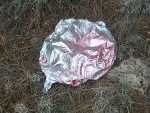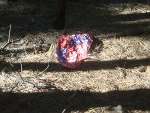
Balloons Blow Post


Have you ever used Biaxially-oriented polyethylene terephthalate? Sure, you have! But, you probably know it as the brand name of Mylar.
It was developed in the 1950s by those great chemical folks at DuPont that also brought us neoprene, teflon, kevlar, tyvek, and panty hose.
Mylar has many uses, but the one we're most likely to see is the cute, shiny, fun party balloon. Mylar balloons can be any shape and color, are lighter than latex balloons, and they keep the gas trapped longer. That's great for parties - BUT it means they can float longer and cover more distance if their ribbon breaks. And, break they do!
On every single one of my long hikes so far, in Arizona, Minnesota, Wisconsin, Virginia, and now Florida last month, I have recovered mylar balloons far out in the wilds - a couple stuck in a cactus, one in a soybean field, four floating in a swamp, and others. I thought I was just unlucky to find this many, but it turns out balloon litter is a Huge Problem that effects the environment, animals, our electric grid, and maybe even air travel. I had no idea.


Non-Mylar, Too
A few years ago, I attended a big Scouting event with my sons at a local amusement park. It was a big deal. To kick off the event, the local council arranged to have a couple thousand helium-filled, latex balloons released. I was not aware the release would happen until I saw the mass of color floating and spreading into the sky. It was sure colorful, but I just thought, "Really?" I was surprised that our Boy Scouts council would be doing such a thing with our emphasis on conservation and outdoor ethics.
All those balloons would disperse far and wide, but I knew they would eventually come to earth in thousands of places across the miles. All balloons that escape into the wild are a problem, regardless of the material used to produce them.
In 1986, Cleveland set the world record by releasing 1.5 million balloons at BalloonFest. It caused air traffic problems and interfered with a helicoptor rescue of two men that ultimately drowned. The organizers expected the balloons to float far away (becoming a litter problem someplace else), but weather caused them to stay right in Cleveland, creating a huge mess.


Main Problems with Balloons
- Every balloon released into the air is litter. They all come back to earth someplace.
- A balloon, whether mylar, plastic, or latex is man-made and takes years to break down. Mylar balloons hang around for a loooooooong time - think decades at least! This is a bad thing!
- A popped balloon, or pieces of balloons, lying in a natural area looks like food to many wild animals. Animals get tangled in the balloon ribbons and die. Animals consume the balloon material and slowly starve with their digestive tract blocked.
- While in flight, balloons may be a nuisance to air traffic, but I could find only this one article that may be a plane crash caused by balloons.
- Mylar balloons, being metallic, can cause fire and power outages when they hit power lines, like this.
- Helium is a non-renewable resource and every floating balloon frivolously wastes a bit. Some estimates are that we will exhaust the earth's usable helium supply in under 30 years.
OK, you get the idea that I feel balloons are floating litter, bad for the world, and possibly dangerous. So, what should we do about it? Well, the two main uses for balloons are Parties and Balloon Releases.


Parties
- If you really want balloons, use latex balloons. They are the least bad.
- Fill balloons with normal air and save the helium for science and other uses that make the world a better place.
- Attach balloons to walls, wire frames, or hang from ceilings. They won't rise on tethers, but they also won't float away.
- Dispose of balloons by having a fun Balloon Popping Party after the party. Place latex balloons in the garbage. Place mylar balloons in recycling.
- Use paper decorations instead of balloons.
- Visit BalloonsBlow.org for some alternate ways to decorate parties, including pinwheels, bubbles, and inflatables.
Balloon Releases
- Don't do it! There's just no valid reason to ever organize, host, support, sanction, encourage, or do a balloon release. It is simply littering, plain and simple.
- These releases are often to kick off an event, as a memorial, or a celebration. Alternative ways to recognize the event could be to fly kites, make giant bubbles, plant a tree, float flowers on a stream or lake, use drums, or even use tethered sky lanterns.
My View
As someone trying to be a good steward of the earth, I do what I can to follow the seven Leave No Trace principles, one of which is Dispose of Waste Properly. I will not purchase helium-filled balloons. I pick up balloon litter I find. I encourage others to explore options to using balloons.
It seems to me to be an easy decision to use an alternative to balloons for decorations and events.
Check out BalloonsBlow.org for more information about the problem of balloon litter from a couple of girls in Florida. Then, decide what you'll do about it where you live, or not.
Posted: 22:21 02-15-2016 1261
Prev: Post-Hike Report
Next: Making FriendsSite Disclosure Statement
Next: Making Friends
archives: 2025 2024 2023 2022 2021 2020 2019 2018 2017 2016 2015 2014 2013 2012 2011
All Comments:
Feb 16, 2016 - bren
Thank you for this post! Great information for everyone. I will
share on my Facebook page. Have a lot of environmental friendly
people who want to do all they can.
Bren
Bren
Feb 17, 2016 - Hiking Dude
Hi Bren
If we do the easy, obvious things like this, I think it will make a difference.
Hiking Dude
If we do the easy, obvious things like this, I think it will make a difference.
Hiking Dude
Ask a Question
Find more Hiking Resources at www.HikingDude.com


Follow Me
Recent Comments